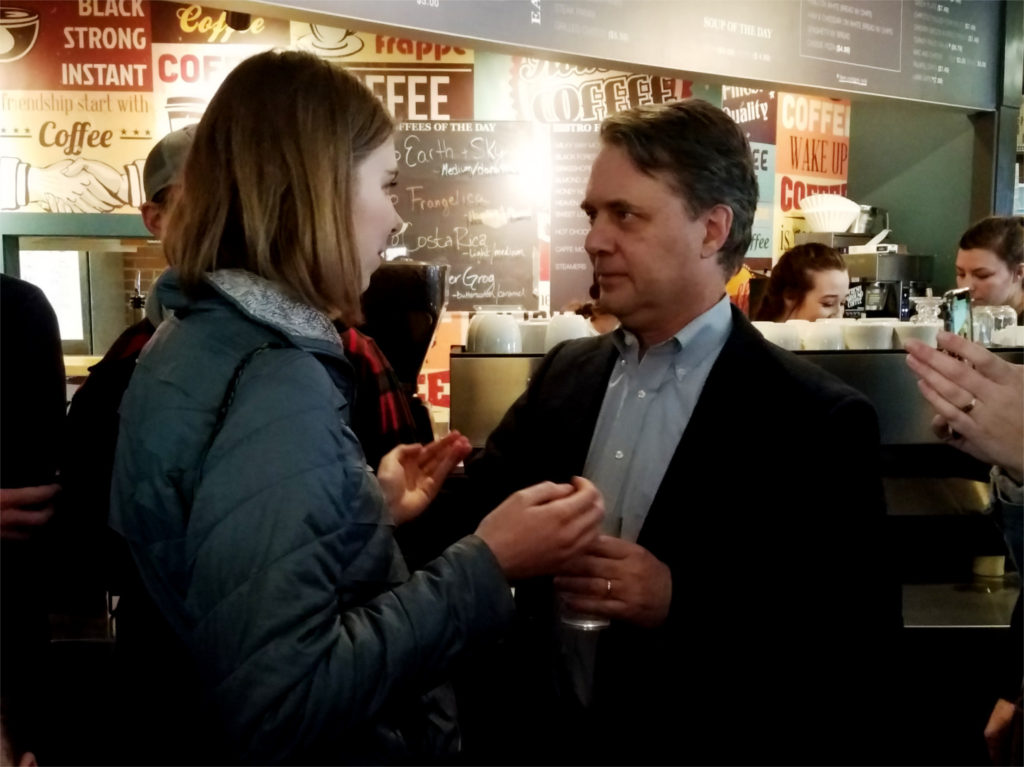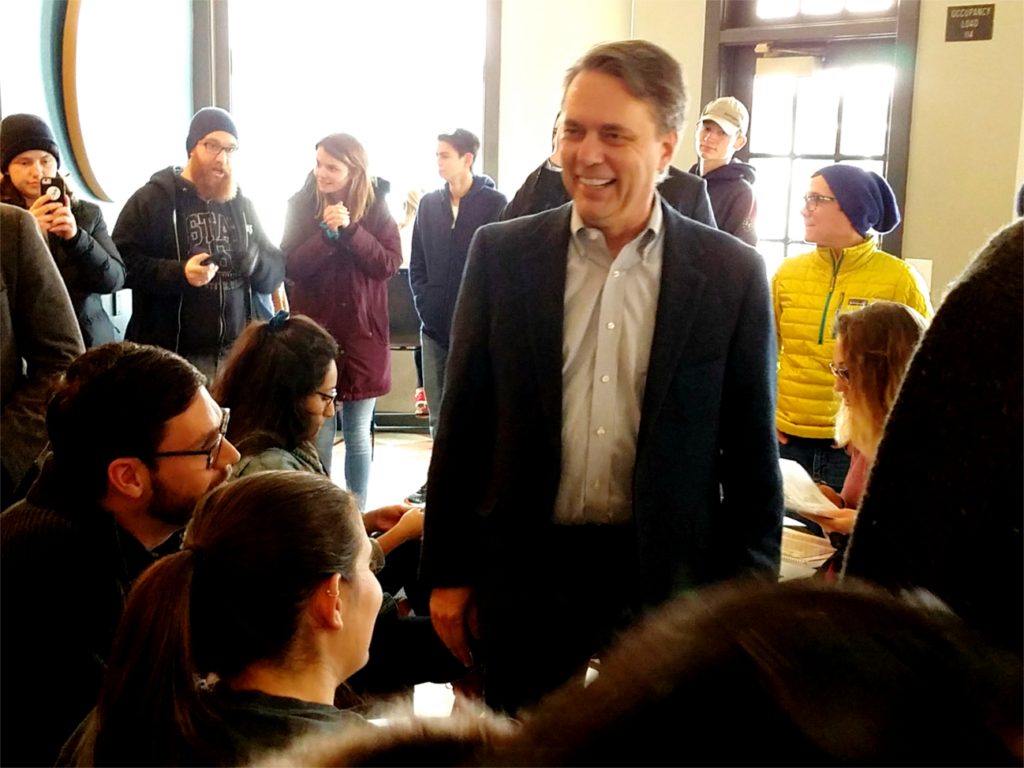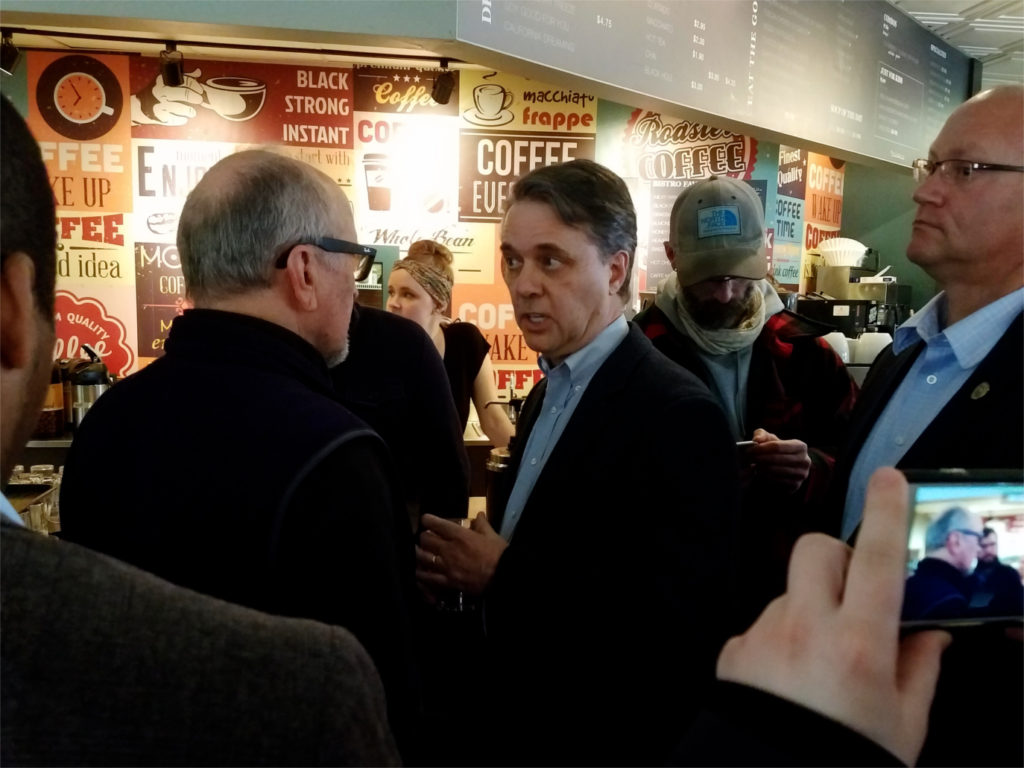
Kansas Gov. Jeff Colyer visits with Corinne Stratton, a 21-year-old K-State senior in political science, inside Bluestem Bistro Saturday afternoon in Manhattan. (Staff photos by Brady Bauman)
For a moment, it appeared new Kansas Gov. Jeff Coyler had cut his trip to the Little Apple short during a frigid Saturday afternoon in Aggieville.
The former lieutenant governor to staunch conservative Sam Brownback made his entrance inside a packed Bluestem Bistro after 2 p.m. and wasted no time to engage with citizens in an effort to fortify his well-publicized call for a “change of tone” in Kansas government.
But the tone on Saturday from those in the bistro was fixated on Medicaid expansion. Medicaid provides coverage for some low-income people, families and children, pregnant women, the elderly, and people with disabilities. In at least 33 states, including Colorado, Medicaid has been expanded under the Affordable Care Act to cover all adults below a certain income level. The federal government picks up 90 percent of those extra costs with funding that is already established.
Gov. Coyler was bombarded with questions about Medicaid expansion — an issue that has increasingly wide support among hospitals, doctors and various healthcare providers across the state and within Manhattan. So much so that following the 2016 elections, the new-look state legislature put a Medicaid expansion bill on Brownback’s desk to sign in March. He vetoed it a few days later.

Kansas Gov. Jeff Colyer addresses patrons inside Bluestem Bistro Saturday afternoon in Aggieville.
Colyer stayed in the coffee shop and responded with counter-points to expansion for 20 minutes or so before he and his staff headed across the street and around the corner to Varsity Donuts less than 200 feet away, as previewed in his itinerary emailed to media.
But those citizens asking questions concerning Medicaid expansion apparently were not satisfied with his answers inside the bistro and followed Colyer and his staff out the door. The questions continued while they crossed the street and the experience didn’t set well with the Overland Park plastic surgeon or his staff — so much so Colyer was quickly ushered into his SUV and driven away.
And for the record, the new governor’s SUV was parked in a no-parking spot on the corner of Moro Street in front of the The Dusty Bookshelf building and across Rally House.
At the time, it seemed he’d cut his trip short and was off to Wamego, the next stop.
But it turned out he’d made it to the Varsity Donuts after all. Roughly fifteenth minutes later Colyer was indeed discovered at the doughnut shop.
Perhaps Colyer wasn’t avoiding questions and rather wanted to make sure his SUV was in compliance with City of Manhattan parking statutes before grabbing a doughnut. Either way, the matter didn’t come up and he agreed to sit down with KMAN at one of Varsity’s booths.
“I’m driving my staff crazy because we’re keeping surgeon’s hours rather than politician’s hours,” Colyer said.
Manhattan was stop No. 4 in a five-stop day. He was previously in Leavenworth, Atchison and Junction City.
“I like talking to a lot of folks,” he said. “Listening, hearing from them. Just listening and getting to know some new people.”
When asked about the predominance of Medicaid expansion questions inside Bluestem Bistro and outside of it, he said Manhattan has been an outlier regarding that issue.
“This is the only place in the state where that’s been the whole question for everybody,” he said. “For me, on the issues that we have — we’ve got a lot of challenges ahead of us. We have to deal with our school fiance and some other things as well.
“But the important thing is that we need to grow our state. And we’re going to take some of that optimism that we have for the state and we can move forward. And as we’re growing the state I think that provides more opportunities for Kansans.”
A month before Brownback’s veto of expansion, Bob Copple, the president of Via Christi Hospital in Manhattan, told KMAN Medicaid expansion would ease its growing costs related to unpaid ambulance fees after a meeting with local government entities. It was also at that meeting he informed them the hospital — which had for decades handled the billing end of both ambulance services for Riley and Pottawatomie counties — would be significantly increasing its fees to each county to make up for those losses. By November, both county commissions terminated their contracts with Via Christi and opted to administrate billing themselves.
Riley County commissioners have said it will use a collection agency to go after unpaid ambulance ride bills. Via Christi, being a Catholic-sponsored hospital, was able to write-off a portion of those balances.
It wasn’t evident if Colyer was aware of those local issues concerning healthcare costs in the state, but Colyer was adamant expansion was not an answer he was interested in.

Kansas Gov. Jeff Colyer speaks with a patron Saturday afternoon in Aggieville.
“Here’s the issue,” Colyer said. “If you talk to Kansans, they’re not interested in expanding Obamacare. And what we’ve seen, is that what Obamacare did, is it took money out of Medicare, which is for seniors, and it has damaged all of our hospitals. And it’s really had a terrible effect on our state. And it’s driven up the cost of everybody’s insurance — mine, yours.
“I take care of people in the emergency room to this day, as governor, people without insurance, and I understand that. And it’s that affordability issue that’s really happened to us. I think we need a more Kansas-based solution that would be stable and more affordable. And what you’re going to see is Washington changing those rules on how this happens and we’re going to deal with those issues.”
According to multiple reports on the Medicare component referenced by Colyer, the Affordable Care Act trimmed future Medicare spending increases over 10 years and payout decreases went to hospitals and doctors, rather than limiting benefits to policy holders. Because of that, there has been concern related to providers accepting less Medicare cases. Also, Brownback’s privatized Kansas-based answer to Medicaid expansion, KanCare, has had its share of problems, namely with its troubles coordinating with the Kansas Department of Health and Environment that include long application backlogs and controversy concerning its disability coverage. At the end of January, Brownback scrapped plans for “KanCare 2.0” after rumblings of rising costs complaints in the legislature.
When asked if he’d sign another Medicaid expansion bill if again passed by the legislature, he said he’d look at it, but expressed that his mind is already made.
“I’ll look at anything that comes across my desk, but I’m not interested in implementing Obamacare,” he said.
Corinne Stratton, a senior at K-State studying political science, was at Bluestem Bistro and advocated for expansion when she met Coyler.
“Knowing that Gov. Colyer is new to the office of governor, I was eager to come and voice my concerns that Kansas needs to expand Medicaid and give coverage to Kansans and he needs to know that is our No. 1 priority,” she said.
Stratton said Colyer countered with economic concerns about expansion.
“The state of Kansas has lost billions of dollars the federal government would have been giving for Medicaid expansion,” she said. “So I don’t know his case there.”
“(Expansion) needs to happen now,” said Taylor Dean, another K-State student who pursued Colyer with questions before he appeared to leave Aggieville.
Before Colyer left Varsity Donuts, he quickly nixed any discussion about the November election and his efforts to still be governor this time next year.
“We’ll look at that, but I’m here doing my job,” he said. “On our very first day I met with both the Democratic leadership and the Republican leadership and started talking about how are we moving forward. We have already gone and replaced six cabinet officers, uh, six cabinet level officials, and we’re redoing how we do government in the state of Kansas — we’re going to be much more responsive.
“The first executive order for us was mandating annual training for sexual harassment prevention and we’re requiring every state employee to do that. We need a very professional government. I’ve also signed several executive orders to make us more transparent, so that people can see what’s going on. And that’s what we’re going to focus on, is getting data to people and being more responsive overall.”
When asked if his championing for a “change of tone” bleeds into policy changes as well, Colyer said it does.
“Absolutely it does,” he answered. “I want to be much more responsive to people. Changing that tone is changing transparency — much more professional. We’re going to deal with the sexual harassment issues and all of that. I want Kansans to know that they’re going to have somebody that will listen to them, that will be straightforward with people.
“I think that tone of a lot of the bickering and all that — we have some tough choices to make, and we can and we will. And I think that’s what Kansas can do and we’re going to be very optimistic about it. And I think if we play our cards pretty straight over the next few years, we may get Kansas to a good place.”
The post New Gov. Jeff Colyer visits Aggieville, dismisses calls for Medicaid expansion appeared first on News Radio KMAN.

